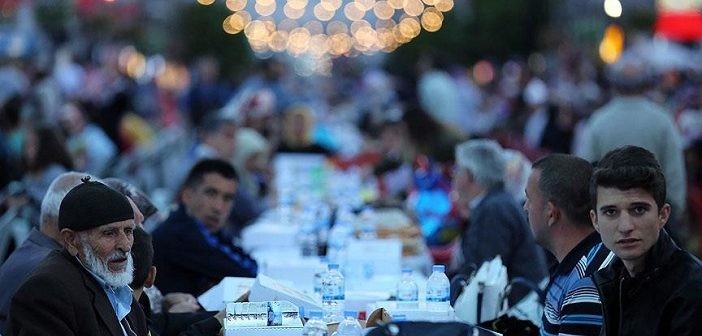
Reading the Qur’an Understandingly
How to read the quran understandingly?
The Messenger of Allah (pbuh) placed the Qur’an in all aspects of his life and was identified with it, and presented a living example of it through his good manners. Below is how elegantly the poet Muallim Naci expresses this fact:
“Hüsn-i Kur’ân’ı görür insan olur hayrân sana
Dest-i kudretle yazılmış Hilye’dir Kur’an sana”
“People admire him seeing the eloquence, rhetoric, and beauties of the Qur’an in him. This Qur’an is your hilyah (description of your qualities) which was written by the Hand of Allah in order to praise you and describe your good manners.”
Those who read Allah’s Words actually read about the personal appearance, manners, character, and life of His Messenger (pbuh). This is why believers should occupy themselves with the Qur’an, read it regularly, contemplate its meaning and apply it to their lives. Our Prophet (pbuh) says that:
“Recite the Qur’an, for on the Day of Resurrection it will come as an intercessor for those who recite it…” (Muslim, Musāfirūn, 252)
The Prophet (pbuh) also encouraged his followers to read the Qur’an regularly saying, “Whoever reads a letter from the Qur’an, a pious deed will be recorded for him/her. For each good deed, there will be ten rewards. I am not saying that alif-lam-mim (الم) is one letter, on the contrary alif is one letter; lām is one letter; and mīm is one letter.” (Tirmidhī, Faḍāil al-Qur’an, 16) Therefore, it is very important for believers to contemplate and read the Qur’an again and again. The following incident is very important in this respect.
“Once a man came to the Messenger of Allah and asked:
“O Messenger of Allah! Which act is more pleasing?” The Prophet (pbuh) replied:
“The actions of hāl and murtahīl” When the man asked again:
“Who are hāl and murtahīl?” Allah’s Messenger (pbuh) said:
“They are those who read the Qur’an from the beginning to the end and whenever they come to the end, they restart reading it from the beginning.” (Tirmidhī, Qiraāt, 11)
Even though reading the Qur’an is considered as an act of worship and great spiritual rewards were promised for it, the real object is to understand it, to live in accordance with it, and to convey its message to other people. This is why a person who is reading it should be in a special state of mind. That is to turn respectfully and longingly towards Allah; to think about the admonitions of the Qur’an; to obey sincerely to its rules; to take lessons from its stories and parables; to say “subhānallah” every time an attribute of Allah is mentioned; to ask for Allah’s blessings every time Paradise or Allah’s mercy are stated; and to take refuge in Allah whenever Hell or Allah’s punishment are mentioned.
While reading the Qur’an believers should think about how that they are in the presence of Allah and He always sees them. They should be in such a state of mind that their Lord is watching and directly talking to them. While reading the Qur’an they should contemplate about Allah, His attributes, His actions, and His majesty; ask for His forgiveness, mercy, and compassion; visualize how enemies of Allah were destroyed and their exemplary ends; and remember the Prophets and other friends of Allah. In short, they should read the Qur’an and be aware of what they are reading. Those who are not able to understand its meaning should prepare their souls for its recitation and act respectfully being aware of that they are performing an act of worship. Thus, their heart will be enlightened with respect and reverence, and the magnificence of the Book of Allah will manifest itself in their hearts. If it is possible, believers should read the Qur’an along with its exegesis. If they cannot, then they should attend the sermons and lessons of knowledgeable commentators.
The companions of the Prophet (pbuh) would divide the Qur’an into groups of ten verses; and they would not begin reading another ten before understanding the previous ten verses and applying their rules in their lives. They used to say that “we got knowledge and action together.” (Ibn Hanbal, V, 410) For instance, Imam Malik narrated that Abdullah b. Umar (may Allah be pleased with them) studied to learn surat al-Baqarah (2) for eight years. (Muwattā, Qur’an, 11) In regards to the latter narration al-Bajī makes the following commentary: “This was not because of his weak memory; but he spent so much time in order to learn and apply Qur’an’s requirements, rules, and other things related to them.” (Kattānī, II, 191)
Jalāl al-Dīn Rumī eloquently states:
“It is related that during the time of the Prophet anyone who knew one sura by heart, or half a sura, was called a great person and pointed out, “He knows a sura by heart,” since in that day they devoured the Qur’an. They were reading the Qur’an like they were devouring something. To devour six baṭmans or twelve baṭmans of bread,[1] is certainly a great accomplishment. But people who put bread in their mouths without chewing it and spit it out again can devour thousands of tons in that way. There happed the warning “There are many readers of the Qur’an to whom Qur’an curses.” This warning is about those who do not understand the meaning of the Qur’an.” (Fihi Mā Fīh, p. 78)
The meanings of the Qur’an are like an endless ocean. It is just like Muhammad Parsa (q.s.) states: “If the real meanings of the verses and letters of the Qur’an were revealed, seven heavens and earth could not stand their weight of manifestation.”
A thinker states:
“Even though all kinds of thoughts about the universe and the existence have been discussed and disclosed, endless and matchless meanings of the Qur’an are waiting behind the curtains in layers for the day they will be understood.”
Just because understanding the Qur’an with all its depth is beyond human capacity, our job is to not quit reading it and to do our best to learn and apply its meanings as much as we can.
This is why we should read the words of the Lord of the universe and all creation with reverence and respect; because getting the utmost benefit from the Qur’an depends on such respectful reading.
Reverence or awe is the people’s respect for their Lord. Those who have knowledge and wisdom and whose hearts are teemed with reverence for Allah prostrate before their Lord and admit His majesty when reading the Qur’an. This is stated in the following verse:
“They fall down on their faces, weeping, and it increased humility in them.” (al-Isrā 17; 109)
The Prophet (pbuh) called those who continuously and reverently read the Qur’an, live in accordance with its principles, and follow its orders and prohibitions in every aspect of their lives as “the people of the Qur’an.” On Judgment Day, the Holy Qur’an will make every effort to save these people, whom it causes to spend their nights sleepless and their mornings thirsty (because of fasting). (Ibn Majah, Adab, 52) Another saying of the Prophet (pbuh) expresses this fact as follows:
“Abu Umama said he heard Allah’s Messenger (pbuh) say:
“Recite the Qur’an, for on the Day of Resurrection it will come as an intercessor for those who recite it. Recite the two bright ones, al-Baqara and Surah al-‘Imran, for on the Day of Resurrection they will come as two clouds or two shades, or two flocks of birds in ranks, pleading for those who recite them…” (Muslim, Musāfirūn, 253)
The Messenger of Allah (pbuh) expresses that people of the Qur’an will be helpful not only for themselves but also for their relatives on Judgment Day:
“Narrated by Mu’adh al-Juhanī: The Prophet (pbuh) said:
“If anyone recites the Qur’an and acts according to its contents, on the Day of Judgment his parents will be given to wear a crown whose light is better than the light of the sun if it was placed in the house of this world. So what do you think of him who acts according to his.” (Abū Dawūd, Witr, 14)
Those who recite the Qur’an but do not act according to its contents cannot be considered as the people of the Qur’an. What is essential for a believer is to make the effort to have the Qur’an the center of his/her life. In fact the importance of understanding the meaning of the Qur’an and feeling it in the hearts is stated in the following lines of poetry:
Kavl-i Bâri’yi işit Bâri’den
Perdedir geç neğam-ı kârîden.
“O reader of the Qur’an! Open the eyes of your heart and see the Word of Allah and hear it from Him the Almighty the Rightful. Melodies of the reciter are curtains before you; do not get attached to them.”
In order to learn and understand the Qur’an, assembling in and conversing about it is one of the acts of obedience praised by the Messenger of Allah (pbuh). The blessings awaiting for such people are expressed in the following saying of the Prophet (pbuh):
“…and those persons who assemble in the house among the houses of Allah and recite the Book of Allah and they learn and teach the Qur’an among themselves there would descend upon them the tranquility; and mercy would cover them; and the angels would surround them; and Allah makes a mention of them in the presence of those near Him…” (Muslim, Dhikr, 38)
Allah’s Messenger (pbuh) attached the utmost attention to the Qur’an and loved and held dear to his companions who did the same. In fact he appointed Uthmān b. al-Abi al-’Aṣ from the representatives of the Thaqīf tribe as their leader because, even though he was the youngest, he was the most knowledgeable of the Qur’an among them.
Representatives of the tribe of Thaqīf had left Uthmān b. al-Abi al-’Aṣ with their animals, because he was the youngest among them. Whenever they went to sleep in the middle of the day, Uthmān (r.a.) was going to the Prophet (pbuh), asking questions about Islam, listening and learning the Holy Qur’an. Thus he memorized some chapters of the Qur’an.
Uthmān (r.a.), who took an oath of allegiance to the Prophet (pbuh) and converted into Islam before the other representatives from his tribe, was going to Abū Bakr or Ubay b. Qa’b (may Allah be pleased with them) and asking them questions , whenever the Prophet (pbuh) was busy. Allah’s Messenger (pbuh) liked his efforts and loved him for that. When the representatives of Thaqīf wanted to go back to their tribe, they said:
“O Messenger of Allah! Appoint one of us as our leader.” And the Prophet (pbuh) appointed Uthmān b. al-Abi al-’Aṣ as their leader even though he was the youngest among them. (Ibn Sa’d, V, 508; Ibn Hishām, IV, 185; Ibn Hanbal, IV, 218)
The Prophet’s (pbuh) regard for the people of the Qur’an also comprised of the dead ones. Narrated by Jabir bin Abdullah:
“At Uhud the Prophet grouped the martyrs into twos to bury them in one grave, and then he asked,
“Which of them knew more of the Quran?” When one of them was pointed out to him, he put that one first in the grave, giving priority to the one who knew the Qur’an better, and said,
“I will be a witness for them on the Day of Resurrection.”
He ordered them to be buried with their blood on their bodies and they were neither washed nor was a funeral prayer offered for them.” (Bukhari, Janāiz, 73, 75)
All these show that carriers of the Qur’an were of great value both in the presence of Allah the Almighty and His Messenger (pbuh).
[1] Batman, is a measure of weight which weighs between two to eight okkas. And an okka is equal to 1283 grams.
Source: An Excellent Exemplar, Osman Nuri Topbaş, Erkam Publications
The Human Reality














